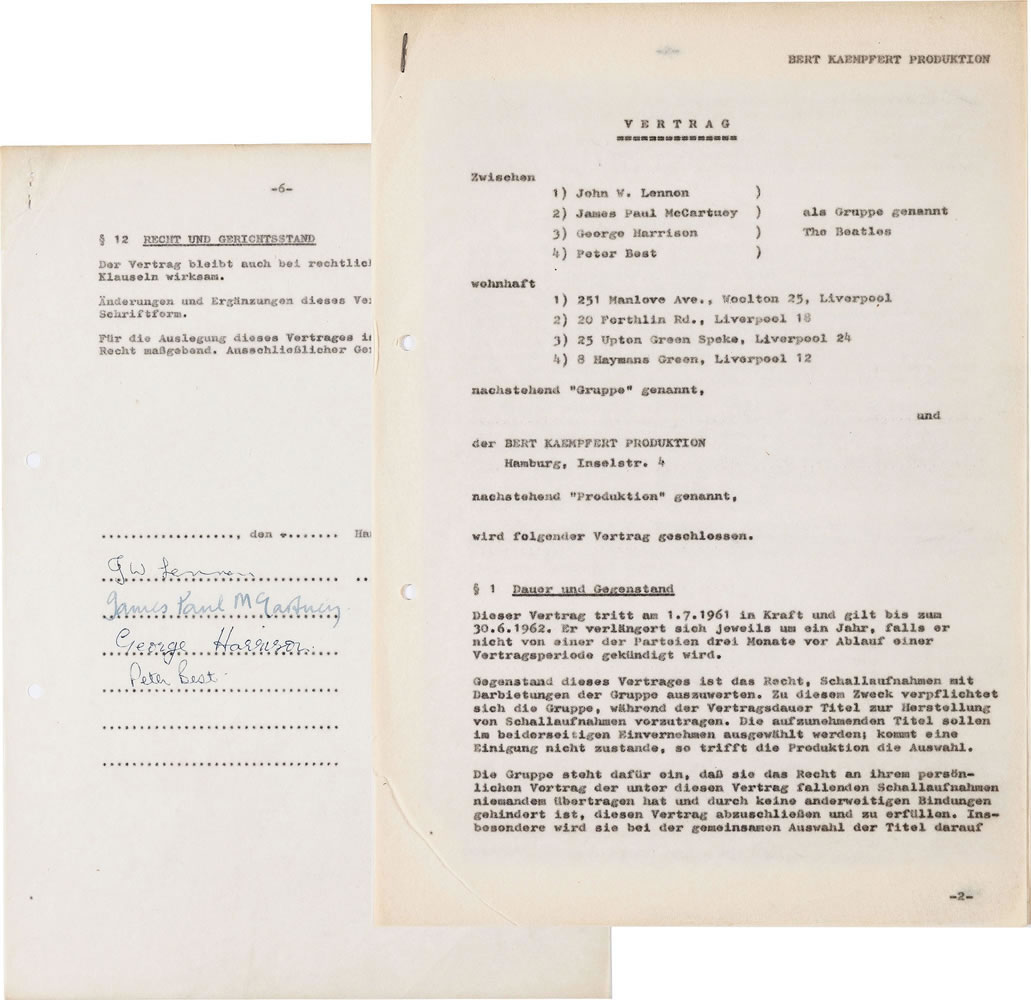NEW YORK — The Beatles’ first recording contract was signed in Hamburg, Germany, where the band honed its craft playing gigs in the city’s boisterous nightclub district.
The 1961 recording session produced the single “My Bonnie.” It was released on the Polydor label in Germany only and never hit the top charts. But the tune led directly to the Beatles’ discovery back home, a contract with EMI the following year and their first hit, “Love Me Do.”
Heritage Auctions will auction the six-page contract in New York on Sept. 19 for an estimated $150,000. It’s the centerpiece of a Beatles collection spanning the band’s entire career. It’s being sold by the estate of Uwe Blaschke, a German graphic designer and noted Beatles historian who died in 2010.
“Not many people know that the Beatles started their careers in Germany,” said Beatles expert Ulf Kruger. “The Beatles had their longest stint in a club in Hamburg at the Top Ten Club. They played there three months in a row, every night. The style they invented in Liverpool, they cultivated in Hamburg.”
“Without this contract all of the pieces wouldn’t have fallen into place,” added Dean Harmeyer, Heritage’s consignment director for music memorabilia, who said the band was “a ramshackle, amateur band” when they first went to Germany. “They were probably a C class in the pantheon of Liverpool bands.”
But their stints in Hamburg between 1960 and 1962 changed that.
“It really is where they honed their musical skills to become the Beatles,” he said. “They set about learning new material, they worked on their instrumental abilities.”
But it was “crazy luck” that got them to Hamburg, he said.
Their booking agent fortuitously ran into a club owner looking for rock ‘n’ roll bands to perform in his Hamburg nightclub. The Beatles were not the agent’s first choice and wound up going only after other bands declined.
When the Beatles — John Lennon, Paul McCartney, George Harrison and original drummer Pete Best — were later hired to be the backup band for British singer/guitarist Tony Sheridan at the Top Ten Club, German record producer Bert Kaempfert signed them and Sheridan to record a rock ‘n’ roll version of “My Bonnie Lies Over the Ocean.”
“My Bonnie” netted the Beatles about $80. It was credited to “Tony Sheridan and the Beat Boys” because Kaempfert felt the name “Beatles” would not cut it with Germans.
The only copies that made it out of Germany initially were the ones sent to the Beatles back home in Liverpool, England. After a local club disc jockey got his hands on one and started playing it, music fans began asking for it. That got the attention of Liverpool record shop owner Brian Epstein, who decided to hear them perform at the Cavern Club.
“He immediately sees their potential. He tells them ‘I want to manage you and I’ll make you successful’ ” — and he did, going on to secure them a record contract with EMI, Harmeyer said.
“Every great collector wants their collection to be illuminative of the subject, and Blaschke’s collection does this so well largely because it also covers the German period,” he said.



